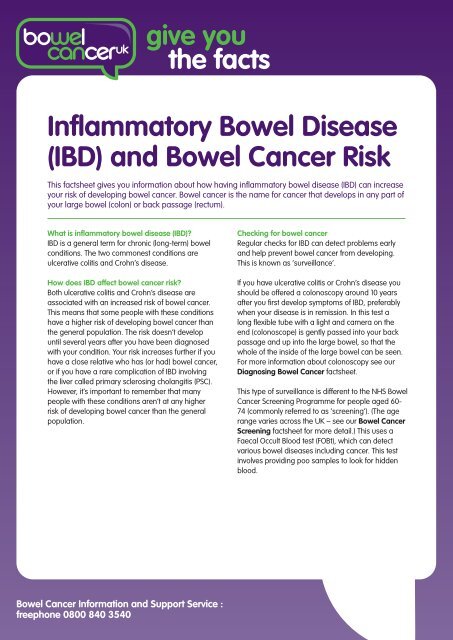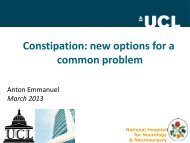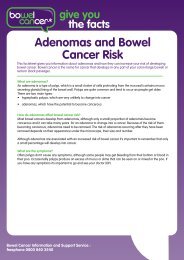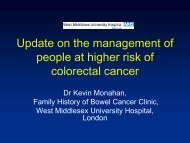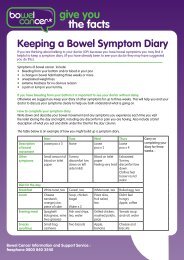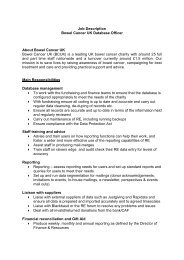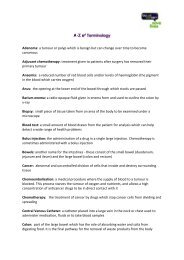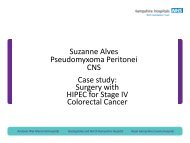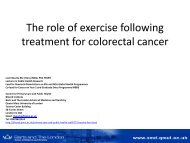(IBD) and Bowel Cancer Risk - Bowel Cancer UK
(IBD) and Bowel Cancer Risk - Bowel Cancer UK
(IBD) and Bowel Cancer Risk - Bowel Cancer UK
Create successful ePaper yourself
Turn your PDF publications into a flip-book with our unique Google optimized e-Paper software.
give you<br />
the facts<br />
Inflammatory <strong>Bowel</strong> Disease<br />
(<strong>IBD</strong>) <strong>and</strong> <strong>Bowel</strong> <strong>Cancer</strong> <strong>Risk</strong><br />
This factsheet gives you information about how having inflammatory bowel disease (<strong>IBD</strong>) can increase<br />
your risk of developing bowel cancer. <strong>Bowel</strong> cancer is the name for cancer that develops in any part of<br />
your large bowel (colon) or back passage (rectum).<br />
What is inflammatory bowel disease (<strong>IBD</strong>)<br />
<strong>IBD</strong> is a general term for chronic (long-term) bowel<br />
conditions. The two commonest conditions are<br />
ulcerative colitis <strong>and</strong> Crohn’s disease.<br />
How does <strong>IBD</strong> affect bowel cancer risk<br />
Both ulcerative colitis <strong>and</strong> Crohn’s disease are<br />
associated with an increased risk of bowel cancer.<br />
This means that some people with these conditions<br />
have a higher risk of developing bowel cancer than<br />
the general population. The risk doesn’t develop<br />
until several years after you have been diagnosed<br />
with your condition. Your risk increases further if you<br />
have a close relative who has (or had) bowel cancer,<br />
or if you have a rare complication of <strong>IBD</strong> involving<br />
the liver called primary sclerosing cholangitis (PSC).<br />
However, it’s important to remember that many<br />
people with these conditions aren’t at any higher<br />
risk of developing bowel cancer than the general<br />
population.<br />
Checking for bowel cancer<br />
Regular checks for <strong>IBD</strong> can detect problems early<br />
<strong>and</strong> help prevent bowel cancer from developing.<br />
This is known as ‘surveillance’.<br />
If you have ulcerative colitis or Crohn’s disease you<br />
should be offered a colonoscopy around 10 years<br />
after you first develop symptoms of <strong>IBD</strong>, preferably<br />
when your disease is in remission. In this test a<br />
long flexible tube with a light <strong>and</strong> camera on the<br />
end (colonoscope) is gently passed into your back<br />
passage <strong>and</strong> up into the large bowel, so that the<br />
whole of the inside of the large bowel can be seen.<br />
For more information about colonoscopy see our<br />
Diagnosing <strong>Bowel</strong> <strong>Cancer</strong> factsheet.<br />
This type of surveillance is different to the NHS <strong>Bowel</strong><br />
<strong>Cancer</strong> Screening Programme for people aged 60-<br />
74 (commonly referred to as ‘screening’). (The age<br />
range varies across the <strong>UK</strong> – see our <strong>Bowel</strong> <strong>Cancer</strong><br />
Screening factsheet for more detail.) This uses a<br />
Faecal Occult Blood test (FOBt), which can detect<br />
various bowel diseases including cancer. This test<br />
involves providing poo samples to look for hidden<br />
blood.<br />
<strong>Bowel</strong> <strong>Cancer</strong> Information <strong>and</strong> Support Service :<br />
freephone 0800 840 3540
give you<br />
the facts<br />
What is my degree of risk<br />
The degree of risk is related to the degree of<br />
inflammation in the bowel, which can be seen<br />
during the colonoscopy. The more inflamed the<br />
bowel, the higher the risk.<br />
Whether or not you are advised to have further<br />
checks will depend on how much inflammation can<br />
be seen. The following is a general guide:<br />
• If you have no active inflammation (where the<br />
lining of the bowel is irritated) you are considered<br />
to be at lower risk. You should be offered a<br />
further colonoscopy after five years.<br />
• If you have mild active inflammation you are<br />
considered to be at medium risk. You should be<br />
offered a further colonoscopy after three years.<br />
• If you have moderate to severe active<br />
inflammation you are considered to be at higher<br />
risk. You should be offered a further colonoscopy<br />
after one year.<br />
To find out more about whether you have a family<br />
history of bowel cancer that may increase your risk,<br />
see our Family History factsheet.<br />
Can I do anything to reduce my risk of bowel<br />
cancer<br />
Doctors <strong>and</strong> researchers don’t yet know the exact<br />
cause of bowel cancer. We do know that certain<br />
factors, including <strong>IBD</strong>, may contribute to a higher<br />
risk. If you have <strong>IBD</strong> you can help to reduce your risk<br />
by.<br />
• managing your lifestyle, such as eating a<br />
healthy diet <strong>and</strong> taking regular exercise<br />
• seeing your doctor for a regular check-up, even<br />
when your <strong>IBD</strong> is in remission<br />
• having regular colonoscopies, according to your<br />
risk (see previous section)<br />
• Other factors may determine when you are<br />
offered further colonoscopies including: postinflammatory<br />
polyps (a polyp is an overgrowth<br />
of cells that protrudes into the bowel; a postinflammatory<br />
polyp sometimes occurs as the<br />
bowel heals after a bout of inflammation), your<br />
family history of bowel cancer, your age <strong>and</strong> your<br />
general health.<br />
Further sources of information<br />
We have a range of related factsheets <strong>and</strong> booklets that you can download from our website here:<br />
www.bowelcanceruk.org.uk/resources<br />
You can also get support <strong>and</strong> information on living with <strong>IBD</strong> from Crohn’s <strong>and</strong> Colitis <strong>UK</strong> – visit<br />
www.nacc.org.uk<br />
To find out more about this product, or to tell us what you think, please call us on 020 7381 9711 or<br />
email feedback@bowelcanceruk.org.uk<br />
© <strong>Bowel</strong> <strong>Cancer</strong> <strong>UK</strong><br />
<strong>IBD</strong> <strong>and</strong> <strong>Bowel</strong> <strong>Cancer</strong> <strong>Risk</strong> factsheet<br />
Information correct at time of publication: November 2012<br />
Date for review: November 2014<br />
For further information contact the <strong>Bowel</strong><br />
<strong>Cancer</strong> Information <strong>and</strong> Support Service:<br />
Freephone 0800 8 40 35 40<br />
Email: support@bowelcanceruk.org.uk<br />
Website: www.bowelcanceruk.org.uk<br />
London office<br />
7 Rickett Street<br />
London SW6 1RU<br />
Tel: 020 7381 9711<br />
Fax: 020 7381 5752<br />
Edinburgh office<br />
20 Queen Street<br />
Edinburgh EH2 1JX<br />
Tel: 0131 225 5333<br />
Fax: 0131 225 2206<br />
Registered Charity Number (Engl<strong>and</strong> & Wales) 1071038. Scottish Charity Number SCO40914. A Company Limited by Guarantee Number 3409832 (Engl<strong>and</strong>). Registered Office (London) as above.


